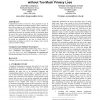Free Online Productivity Tools
i2Speak
i2Symbol
i2OCR
iTex2Img
iWeb2Print
iWeb2Shot
i2Type
iPdf2Split
iPdf2Merge
i2Bopomofo
i2Arabic
i2Style
i2Image
i2PDF
iLatex2Rtf
Sci2ools
SAC
2004
ACM
2004
ACM
Trust enhanced ubiquitous payment without too much privacy loss
Computational models of trust have been proposed for use in ubicomp environments for deciding whether to allow customers to pay with an e-purse or not. In order to build trust in a customer, a means to link transactions using the same e-purse is required. Roughly, trust is a result of knowledge. As the number of transactions increases, the resulting increase in knowledge about the user of the e-purse threatens privacy due to global profiling. We present a scheme (and its prototype) that mitigates this loss of privacy without forbidding the use of trust for smoothing payment by giving the opportunity to the user to divide trust (i.e. transactions) according to context (e.g. location, user’s current activity or subset of shops). Categories and Subject Descriptors K.4.1 [Computers and Society]: Public Policy Issues – Privacy; K.4.4 [Computers and Society]: Electronic Commerce – Cybercash, digital cash; K.6.5 [Management of Computing and Information Systems]: Security and Protection...
| Added | 30 Jun 2010 |
| Updated | 30 Jun 2010 |
| Type | Conference |
| Year | 2004 |
| Where | SAC |
| Authors | Jean-Marc Seigneur, Christian Damsgaard Jensen |
Comments (0)

